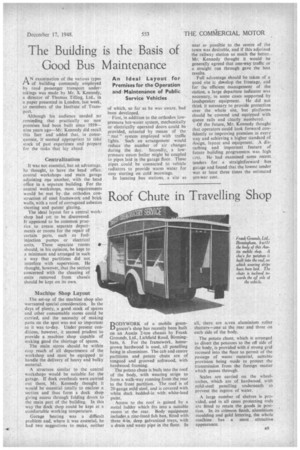The Building is the Basis of Good Bus Maintenance
Page 43

If you've noticed an error in this article please click here to report it so we can fix it.
An Ideal Layout for Premises for the Operation and Maintenance of Public Service Vehicles
AN examination of the var.ous types of building commonly employed by road passenger transport undertakings was made by Mr. S. Kennedy, a director of Thomas Tilling, Ltd., in a paper presented in London, last week, to members of the Institute of Transport.
Although his audience needed no reminding that practically no new premises had been built since 1939— nine years ago—Mr. Kennedy did recall this fact and added that, in consequence, it seemed appropriate to take stock lof past experience and prepare for the tasks that lay ahead.
Centralization
It was not essential, but an advantage, he thought, to have the head office, central workshops and main garage adjoining one another, with the head office in a separate building. For the central workshops, most 'requirements would be met by the orthodox construction of steel framework and brick walls, with a roof of corrugated asbestos sheeting and patent glazing.
The ideal layout for a central workshop had yet to be discovered. lt. appeared to be common practice to create separate departments or rooms for the repair of certain parts, such as fuelinjection pumps or electrical units. These separate rooms should, in his opinion, be kept to a minimum and arranged in such a way that partitions did not interfere with supervision. He thought, however, that the section concerned with the cleaning of units removed from chassis should be kept on its own.
Machine Shop Layout
The set-up of the machine shop also warranted special consideration. In the days of plenty, a good stock of spares and other consumable stores could be carried, and the necessity of making parts on the spot was not so important as it was to-day. Under present conditions, however, it seemed prudent to provide a machine shop capable of making good the shortage of spares.
The main stores should be within easy reach of all departments of the workshop and must be equipped to handle the delivery of heavy and bulky material.
A structure similar to the central workshops would be suitable for the garage. If dock overhauls were carried out there, Mr. Kennedy thought it would be essential totally to enclose a section and thus form a dock shop giving access through folding doors to the main part of the building. In this way the dock shop could be kept at a comfortable working temperature.
Garage heating was a difficult problem and, where it was essential, he had two suggestions to make, neither of which, so far as he was aware, had been developed.
First, in addition to the orthodox lowpressure hot-water system, mechanically or electrically operated doors could be provided, actuated by means of the mat" system employed with traffic lights. Such an arrangement would reduce the number of air changes during the day. Secondly, a lowpressure steam boiler might be coupled to pipes laid in the garage floor. These pipes could be connected to vehicle radiators to provide warm water for easy starting on cold mornings.
In locating bus stations, a site as near ae possible to the centre of the town was desirable, and if this adjoined the railway station so much the better. Mr. Kennedy thought it would he generally agreed that one-way traffic or a straight run through gave the best results.
Full advantage should be taken of a good site tc develop the frontage. and for the efficient management of the station, a large departure indicator was necessary, in some cases supported by loudspeaker equipment. He did not think it necessary to provide protection over the whole site, but platforms should be covered and equipped with queue rails and clearly numbered.
Of the future, Mr. Kennedy thought that operators could look forward confidently to improving premises in every way and achieving a higher standard of design, layout and equipment. A disturbing and important feature of future building programmes was high cost. He had examined some recent tenders for a straightforward bus garage and found that the lowest tender was at least three times the estimated pre-war cost.




























































































